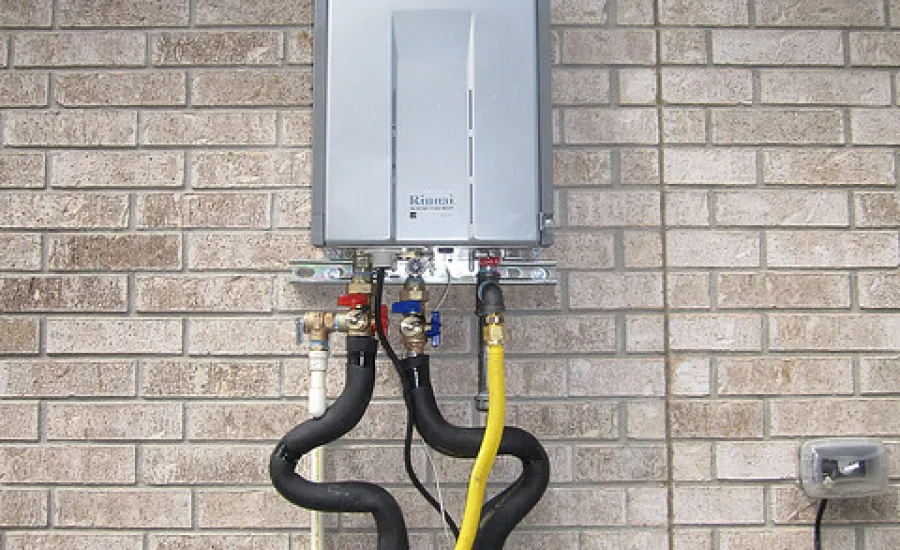There are two ways to insulate an outdoor tankless water heater: with a water heater blanket or with spray foam insulation.Water heater blankets are less expensive and easier to install, but they don’t always provide as much of an insulation barrier as spray foam insulation. If you choose to use a water heater blanket, be sure to wrap it around the entire unit, including any exposed pipes. For added protection, you can also purchase a weatherproof cover for your tankless water heater.
Spray foam insulation is more expensive than a water heater blanket, but it will create a tighter seal around your unit and better protect it from the elements. When using spray foam insulation, be sure to follow the manufacturer’s instructions carefully and wear protective gear, such as gloves and a respirator mask.
- Choose an outdoor location for your tankless water heater
- Place the unit on a firm, level surface
- Install a watertight base pan under the unit, if desired
- Insulate any exposed piping with pipe insulation sleeves or wrap
- Cover the entire unit with a weatherproof tarp or housing
- Seal all openings and seams with silicone caulk or similar waterproof sealant
How to Protect Tankless Water Heater from Freezing
Most tankless water heaters have a built-in protection mechanism to prevent freezing, but there are still some things you can do to protect your tankless water heater from the cold.
First, make sure that the unit is properly insulated. This will help keep the heat in and the cold out.
You can purchase special insulation kits for this purpose, or simply wrap the unit in blankets or towels.
Second, if you live in an area where temperatures routinely dip below freezing, you may want to consider installing a secondary heating source near your tankless water heater. This could be an electric space heater or even a small propane heater.
Just be sure to follow all safety precautions when using any type of supplemental heating device.
Finally, if you know that sub-freezing temperatures are on their way, it’s always a good idea to shut off your tankless water heater and allow it to thaw out before turning it back on again. This simple precaution can save you a lot of headaches – and money – down the road.
How Do I Protect My Outside Tankless Water Heater
If you have an outside tankless water heater, there are a few things you can do to protect it from the elements. First, make sure it is properly insulated. This will help keep the unit warm in winter and cool in summer.
Second, consider placing a cover over the unit to protect it from rain, snow, and ice. Third, if possible, position the unit so that it is not in direct sunlight. This will help prevent premature fading and deterioration of the unit.
Finally, check the unit regularly for any signs of wear or damage and have it serviced as needed to keep it in top condition. By following these simple tips, you can enjoy many years of trouble-free operation from your outside tankless water heater.
Tankless Water Heater Blanket
Water heaters are an essential part of any home, providing hot water for cooking, cleaning and bathing. A tankless water heater can be a great option for those looking for an energy-efficient way to heat their water. A tankless water heater blanket can help to further increase the efficiency of your unit by keeping it warm when it’s not in use.
A tankless water heater blanket is a thick insulating material that wraps around your unit. This helps to keep the heat in, which means your unit won’t have to work as hard to maintain a consistent temperature. Tankless water heater blankets are typically made of fiberglass or another type of insulation, and they’re easy to install yourself with just a few simple tools.
There are a few things to keep in mind if you’re considering using a tankless water heater blanket. First, make sure that your unit is compatible with a blanket – some models aren’t! Second, take care when installing the blanket so that you don’t damage any of the components inside the unit.
And finally, be sure to check the manufacturer’s instructions before using any kind of insulation on your tankless water heater.
If you want to improve the efficiency of your tankless water heater, consider using a tankless water heater blanket!
Winterize Tankless Water Heater Rv
If you have a tankless water heater in your RV, you’ll want to winterize it before putting your RV away for the season. Here’s how to do it:
1. Drain the water heater.
This can be done by opening the drain valve and allowing all the water to run out.
2. Flush the system with clean water. You can do this by attaching a hose to the inlet side of the unit and running clean water through it until it comes out clear on the other end.
3. Add RV antifreeze to the system. You’ll need to do this on both the inlet and outlet sides of the unit. Be sure to follow the manufacturer’s directions for how much antifreeze to use.
4. Run some antifreeze through all of your faucets and drains inside your RV as well, just to be safe!
By following these steps, you can be confident that your tankless water heater will stay in good condition all winter long while your RV is stored away.
Navien Tankless Water Heater Freeze Protection
If you live in an area where the temperature drops below freezing, you need to take special care of your Navien tankless water heater. That’s because the water inside the unit can freeze, causing damage to the unit and leaving you without hot water.
There are a few things you can do to prevent this from happening.
First, make sure that the unit is properly insulated. This will help keep the water inside warm enough that it won’t freeze. Second, if possible, keep the unit indoors during periods of cold weather.
third, run hot water through the unit regularly, even if you’re not using it. This will help keep the water inside moving and less likely to freeze.
If your Navien tankless water heater does freeze, don’t panic.
Just turn off the power to the unit and call a service technician for assistance. With proper care and maintenance, your Navien tankless water heater will give you many years of trouble-free operation.

Credit: thepinkplumber.com
Do Outdoor Tankless Water Heaters Need to Be Covered?
Outdoor tankless water heaters need to be covered for a number of reasons. First, the cover will protect the unit from weather damage. Second, the cover will keep debris and animals from getting into the unit and causing problems.
Third, the cover will help to keep the unit clean and free of dirt and dust. Finally, a cover will help to prevent rust and corrosion on the unit.
Can an Outside Tankless Water Heater Freeze?
If you live in an area with cold winters, you may be wondering if your outside tankless water heater can freeze. The answer is yes, it is possible for the unit to freeze if the temperatures outside drop below freezing. If this happens, it’s important to thaw out the unit as soon as possible to prevent any damage from occurring.
There are a few things that you can do to help prevent your outside tankless water heater from freezing. First, make sure that the unit is properly insulated. This will help keep the heat in and the cold out.
You can also install a heating element inside the unit to help keep it warm. Finally, make sure that you keep an eye on the temperature outside and take steps to thaw out the unit if necessary.
If your outside tankless water heater does freeze, don’t panic!
Just follow these steps to safely thaw it out:
1) Turn off the power to the unit at your main breaker box.
2) Disconnect any hoses or pipes that are attached to the unit so that there is no water flowing into it.
3) Place a space heater or hair dryer near the inlet and outlet connections on the unit and turn it on low or medium heat. Do not use high heat as this could damage the unit. 4) Once you see steam coming from both connections, turn off the space heater or hair dryer and let theunit thaw out completely before turning it back on again and reconnecting any hoses or pipes.
.
Do Tankless Water Heaters Need to Be Insulated?
One of the most common questions we get asked is whether or not tankless water heaters need to be insulated. The answer is a bit complicated and depends on several factors.
First, let’s start with how tankless water heaters work.
Tankless water heaters don’t actually store hot water like traditional water heaters. Instead, they use a heating element to quickly raise the temperature of cold water as it passes through the unit.
Because tankless water heaters don’t have a storage tank full of hot water, they are much more efficient than traditional water heaters.
In fact, they can save you up to 34% on your energy bills!
Now that we know how tankless water heaters work, let’s talk about insulation. Insulation is important for two main reasons: to prevent heat loss and to protect against freezing temperatures.
When it comes to preventing heat loss, insulation helps keep the heated water in the unit from cooling off too quickly. This is especially important if your tankless unit is located in an unheated space like a garage or attic. Without insulation, the heated water can cool off very quickly, which reduces the overall efficiency of the unit.
In terms of freezing temperatures, it’s important to insulate your tankless unit if it will be exposed to temperatures below freezing. If cold weather causes theunit itself orthe pipes leadingto freeze, this can damagethe unit beyond repair! So if you live in an area where freezing temperatures are common, it’s definitely worth investing in some insulation for your tankless unit.
How Do You Winterize an Outdoor Hot Water Heater?
If you have an outdoor hot water heater, winterizing it is a simple process that will help protect it from the cold weather. Here are the steps you need to take:
1. Disconnect the water supply line from the hot water heater.
This will ensure that no water can get into the unit and freeze, causing damage.
2. Drain the hot water heater completely by opening the drain valve at the bottom of the unit. Let all of the water drain out until only air is coming out of the valve.
3. Close the gas shut-off valve located on the side of the unit. This will prevent any gas from getting into and damaging the unit during winter.
4. Cover the entire hot water heater with a heavy duty tarp or cover specifically designed for outdoor use.
Make sure that there are no gaps or openings where snow or rain could get in and damage your unit further.
Conclusion
If you have an outdoor tankless water heater, there are a few things you can do to help insulate it and keep it from freezing. One is to simply wrap the unit in something like a tarp or bubble wrap. You can also buy a special blanket made specifically for tankless water heaters.
Another option is to build a small shed or enclosure around the unit to protect it from the elements. Whatever method you choose, just be sure that there is enough ventilation so that the unit doesn’t overheat.
